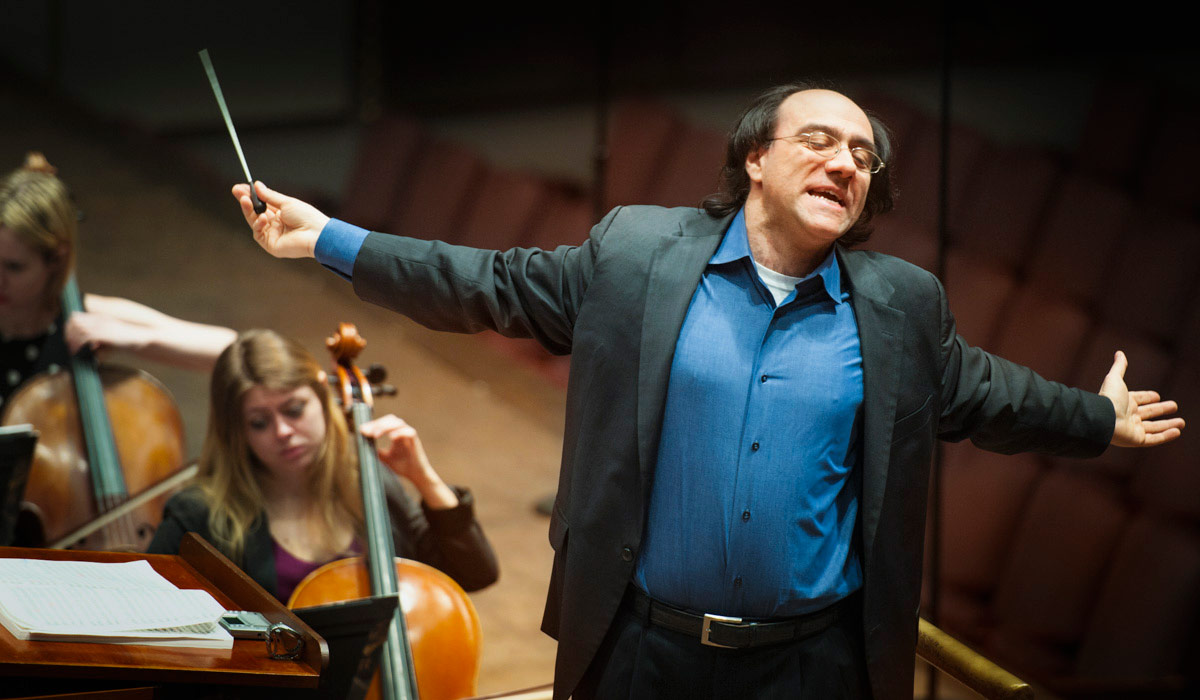
Prerequisites and Entrance Requirements
The applicant must be accepted as a graduate student by the Departments of Music and must have a master's degree from an accredited institution. The applicant must also submit to the advisory committee
- a repertoire list;
- programs and critical reviews if available;
- a complete description of conducting and related professional experience; and
- two letters of recommendation (one from a professional colleague, not teacher of the applicant) attesting to the applicant’s past and potential ability as a conductor.
The following entrance examination requirements must be completed successfully:
- an entrance audition with the CUA Symphony Orchestra before a faculty committee;
- a written examination pertaining to general knowledge of the orchestral field;
- an aural examination;
- an individual interview with the orchestra director;
- Research Methodology or its equivalent; and
- written examinations (two hours each): music history placement examination and music theory placement examination.
Program of Study
In the first year of the graduate conducting program, the student will study with one of the major orchestral conducting faculty, but may participate in the open studio opportunity for short-term study with a specialist in specific repertoire, including choral music and musical theatre, from the Departments of Music faculty. Beginning in the second full year of study, the student will alternate between the major orchestral conducting faculty each semester to receive the full benefit of varied interpretative and technical perspectives.
The D.M.A. committee, in conference with the student, will arrange a program of study of approximately 62 to 65 semester hours beyond the master's degree.
Field Experiences for D.M.A. Orchestral Conductors
The doctoral student will observe and assist with at least one Catholic University opera production and at least one Catholic University musical theatre production. The requirement could alternatively be fulfilled with outside organizations with the approval of the major professor. Satisfactory completion of the requirement is contingent upon approval of the major professor and a positive evaluation from the supervising/host conductor. The student will also spend a minimum of two semesters observing one or more approved outside ensembles. The orchestral conducting division will assist the student in finding a suitable placement with an outside organization. In the event that an appropriate outside ensemble cannot be found, the student may fulfill the requirement with Catholic University ensembles as approved by the major professor. Satisfactory completion of the requirement is contingent upon approval of the major professor and a positive evaluation from the supervising/host conductor.
Graduation Requirements
Four recitals (18 semester hours). The student must present four recitals for credit. The exact nature of the first three recitals (each MUS 917; each four semester hours) is flexible and will be determined by the adviser and the student. The fourth recital must be a lecture-recital (MUS 903, six semester hours). All recitals must be approved in advance by the adviser. When feasible they should represent a diversity of performance mediums: orchestra, chorus, wind ensemble, large chamber ensemble, etc.; however, recital repertoire should reflect a high level of artistic quality, regardless of the medium. The student is required to conduct at least one substantial work from memory on one of these recitals, as approved by the adviser. Printed programs and program notes are required for all recitals.
All recitals must be videotaped. Two copies of each recital program and one videotape of each recital must be submitted to the adviser within two weeks after each recital has been performed in public. After review by the advisory committee, recital programs will be deposited in the student's academic file. The lecture-recital differs from the other degree recitals both in scope and format.
It should last approximately one hour, with no intermission. The advisory candidate should assume that it will be delivered before a group of graduate music students at a university. The topic of the lecture-recital must be approved by the adviser at least six months prior to the presentation date. During the research and writing stages, the student will meet regularly with the adviser.
The lecture-recital should reflect a balance between speaking and performing. All musical examples need not be performed live; limited use of taped examples is acceptable. In addition to the lecture-recital, the student must complete a scholarly research paper on the topic of the lecture-recital presentation. The paper must reflect a high standard of scholarship, both in research and writing, appropriate for the doctoral level. Two copies of the research paper must be submitted to the adviser.
Approval of the paper is required before the lecture/recital requirement is satisfied.
Reading proficiency examination (noncredit). The student must pass a reading proficiency examination in two languages, normally in German and Italian. With the adviser's approval, French may be substituted.
Final comprehensive oral examination (noncredit). Successful completion of a final comprehensive oral examination before a faculty committee constitutes the final requirement.
Minor in Musicology
The advisory committee, in conference with the student, will arrange a program of study of 62 to 65 semester hours beyond the master's degree, which will include at least 12 semester hours of musicology courses beyond the minimum number of hours already required for the degree. Three of those semester hours must be Research Methodology (MUS 731), unless the student has taken a similar course for the master's degree. At the conclusion of coursework, the student will take a written, four-hour minor comprehensive examination (based on four musicology courses selected by the student).
